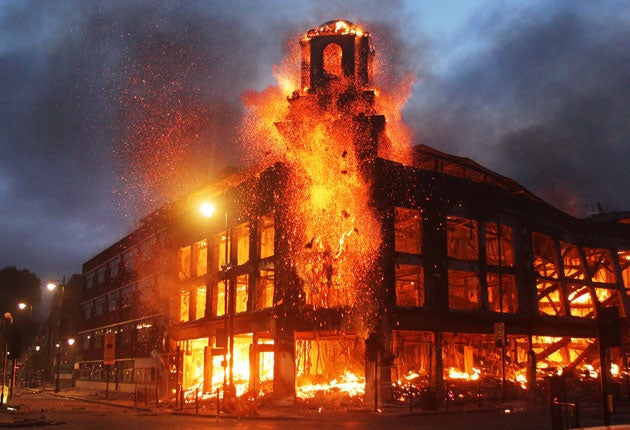Riots are 'justice system wake-up call'

The violence and looting in high streets across England was a "wake-up call for the criminal justice system", the head of Scotland Yard said today.
Acting Commissioner Tim Godwin said the fact that four fifths of those arrested had previously had contact with the police and three quarters had a criminal record raised serious questions for the police.
His comments came as Justice Secretary Kenneth Clarke and London Mayor Boris Johnson said the riots were a result of a "broken penal system" which fails to stop "a feral criminal underclass" from reoffending.
"I think this is a wake-up call for the criminal justice system," Mr Godwin said.
"We have in London been seeking to speed up justice, make it more relevant, make it more relevant to communities, and that's something that we need to do.
"The amount of people who have previous convictions does pose questions for us."
It was "absolutely essential" to look at which type of offences had previously been committed by those with criminal records, he said.
"The key for us is that crime has to have a consequence."
Asked about the swift and tough sentencing in the wake of the riots, he added: "I think the criminal justice system has shown what, in fact, it can do. I think that did have an impact."
London Mayor Boris Johnson also said society needed to consider what was happening to offenders when they were behind bars.
Giving evidence to the Commons Home Affairs Select Committee, he said: "We need to ask as a society what is happening to these people (after they have been jailed). How are we changing their lives so they don't come out again and go back to gangs?
"Out of these events, good must come.
"We have got to look at issues around members of, as Ken Clarke referred to them this morning, members of the feral criminal underclass.
"What was going to make you more likely to riot? It was previous contact with the police, and that's the problem that we need to tackle."
Only one in five of those arrested had a gang affiliation, he said, and 21% were under 18.
The mayor added that he was not trying to minimise gang culture, saying it was a problem that needed to be tackled and was being tackled.
But 83% - more than four in five - of those arrested had had some contact with the police and three in four had a criminal record, he said.
Mr Johnson said it was a "real difficulty we're having in finding adequate punishments and adequate ways of turning their lives around".
Earlier, writing in The Guardian, Mr Clarke said the "broken penal system" had failed to stop the "criminal classes" from reoffending.
He said that there was "a feral underclass, cut off from the mainstream in everything but its materialism" and called for Government action to tackle "an appalling social deficit" revealed by August's unrest.
Mr Clarke's outspoken comments came as a new study to examine the causes and effects of last month's disorder was launched.
Reading The Riots, compiled by The Guardian and the London School of Economics, will include surveys of those who took part in the disorder and interviews with residents, police and the judiciary.
The report will also analyse two databases put together by the newspaper, which contain more than 2.5 million riot-related Twitter messages and statistics about more than 1,000 defendants who have appeared in court charged with riot-related offences.
Senior politicians and legal figures have expressed widely differing opinions about appropriate punishments for those involved in the violent unrest and looting.
Keir Starmer QC, the director of public prosecutions, warned on Friday that they should be treated in the same way as other offenders.
But Prime Minister David Cameron has praised the "tough message" that the courts have been handing out.
Shadow justice secretary Sadiq Khan accused Mr Clarke of failing to offer any solutions to the problems.
"The deep cuts to the MoJ (Ministry of Justice) budget means that there aren't the resources to carry out proper rehabilitation programmes," he said.
"This Tory-led Government has no coherent strategy to appropriately punish and reform offenders and are putting at risk the steep decline in crime we saw under Labour."
But Vicki Helyar-Cardwell, director of the Criminal Justice Alliance, said the fact that most adults charged over the riots have previous convictions was "a hard-hitting reminder that our justice system is failing to rehabilitate people".
"We have become over-reliant on prison as punishment, without recognising what it cannot achieve," she said.
Meanwhile, Sir Hugh Orde, president of the Association of Chief Police Officers (Acpo), said that the cost to forces of asking officers from other areas for help during the riots, a process known as mutual aid, has hit £50 million nationally, including more than £35 million for the Metropolitan Police alone.
On top of this, the riots cost the Met a further £39 million in "opportunity costs" - such as moving resources from other activities to public order duties, changing shift patterns and altering days off - taking the total cost of the riots to the Met to £74 million, the MPs heard.
And a total of about 100 uninsured people have so far made claims totalling £9.3 million following damage to property.
PA